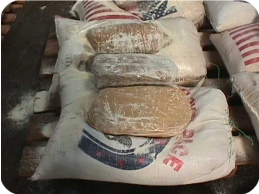![]()

Seized Cocaine on bags of rice where it was hidden.
 |
 |
![]()
![]()
When Customs officials
seized a
shipment of garden furniture constructed entirely of solidified cocaine,
they knew that the art and craft of drug smuggling had evolved to a new,
unexpected level. "Pretty soon," one bemused official predicted,
"the cartels will be making Boeing 757's out of cocaine and flying
them right into [the] airport."
![]()
Customs officials seized a shipment of garden furniture constructed
entirely of solidified cocaine
![]()
Don't rule it out.
In 2000, the international drug syndicate continues to outpace legitimate
global trade in both productivity and innovation, churning out thousands
of tons per day of cocaine, heroin, marijuana, and an assortment of specialty
and designer drugs for valuable markets in the U.S. and abroad.
Today's wholesale cocaine industry operated by Mexico's cartel is a $30 billion per year business -- a figure that easily outstrips revenues reported by giants like Ford, General Motors, Wal-Mart, Exxon, and General Electric. The Cali cartel in Colombia, major processors and distributors of much of the cocaine coming into the U.S., currently battles for market share with competing syndicates. At the same time, it's not unusual to see international drug smuggling organizations broker temporary alliances to facilitate different operational goals and to leverage different areas of expertise -- acquisition, processing, distribution, and revenue collection (a.k.a. money laundering). The result is a multinational industry running at optimum efficiency, equipped with the technological, logistical, and professional resources of which legal industrial giants -- and Federal law enforcement organizations -- can only dream.